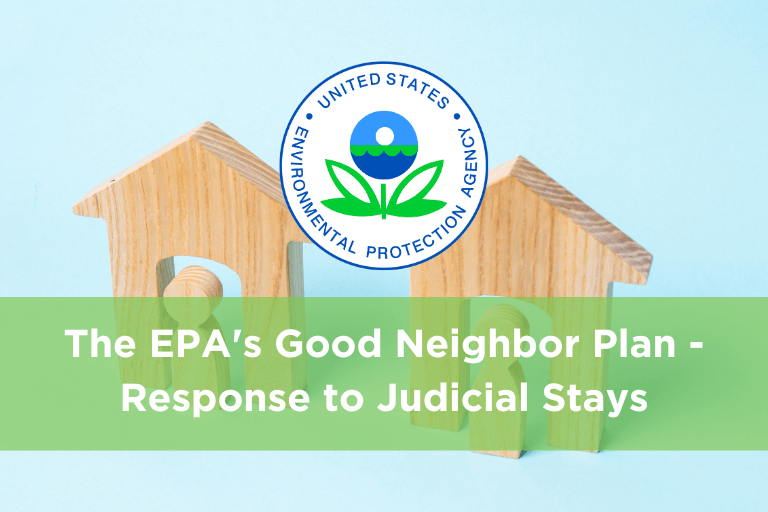What is the Good Neighbor Plan (GNP)?
On July 31, 2023, the Environmental Protection Agency (EPA) issued a final action to address emission sources affected by judicial stays of the Good Neighbor Plan in the following states: Arkansas, Kentucky, Louisiana, Mississippi, Missouri, and Texas. This action also revises three near-term deadlines for those states not affected by the stay.
The GNP and previous Cross-State Air Pollution Rule (CSAPR) updates address ozone-forming emissions of NOx from power plants and industrial facilities. The effective date of the GNP was August 4, 2023, previously affecting 23 states. The EPA is clarifying that although emission sources in Arkansas, Kentucky, Louisiana, Mississippi, Missouri, and Texas are not required to meet the GNP, they are still required to meet previous CSAPR updates.
For the states not required to meet the GNP, the EPA will require Electric Generating Units (EGUs) to participate in two separate Group 2 trading programs as opposed to a Group 3 trading program.
For states not affected, three deadlines were revised:
New deadline was August 4, 2023
New deadline is October 30, 2023
New deadline is December 4, 2023
What Do These Changes Mean?
Facilities in newly-affected states will see changes in their electronic monitoring plans in the Emissions Collection Monitoring Plan System (ECMPS). Newly affected states include those moving from Cross-State Air Pollution Rule (CSAPR) Group 2 to Group 3 and those not previously covered by CSAPR (Nevada, Utah, and Minnesota). These facilities will begin reporting emissions as Group 3 from August 4th to September 30, 2023, with reports due on October 30, 2023.
They will also be included in the Group 3 allowance trading program for the 2023 Ozone Season. In addition, large coal-fired EGUs will have a daily backstop emission limit of 0.14 lb/MMBtus. This limit starts in 2023 for units with Selective Catalytic Reduction (SCRs) and in 2023 for those without SCRs. Units exceeding this rate will have increased allowance surrender obligations.
States not required to meet the GNP may also have some changes to the monitoring plants reflecting the new move to the Group 2 programs. Large coal-fired units in these states will not have a daily backstop limit.
Why May These Be Important?
- Changes in the trading program have significantly increased the cost of allowances from hundreds to thousands of dollars each for the new Group 3 program, which may cause a facility to rethink its emissions monitoring strategy.
- Facilities without Selective Catalytic Reduction (SRCs) may need to consider the installation of SCRs.
- Facilities that are new to the program may need to modify their Data Acquisition Systems (DAS) for emission reporting and new emission limits (e.g., NOx backstop for coal units).
- In addition, and although not part of the trading program, NOx Emission Standards will apply to nine large industries in 20 states starting with the 2023 Ozone Season:
- Reciprocating Internal Combustion Engines (RICE) in Pipeline Transportation for NG
- Kilns in Cement and Concrete Product Manufacturing
- Reheat furnaces in Iron, Steel Mills, and Ferroalloy Manufacturing
- Solid Waste Combustors or Incinerators
- Furnaces in Flat Glass and Glass Products Manufacturing
- Boilers in Iron and Steel Mills and Ferroalloy Manufacturing, Metal Ore Mining, Basic Chemical Manufacturing, Petroleum, and Coal Products Manufacturing, and Pulp, Paper, and Paperboard Mills
How Can ESC Spectrum Help?
If you have any questions about how the Good Neighbor Plan may affect your air emissions compliance and monitoring processes, please contact our Regulatory Services team.
ESC Spectrum Regulatory Services team has over 50 years of experience helping customers comply with local, state, and federal regulations. We can assist you with services for Quality Assurance/Quality Control (QA/QC), Monitoring Plans, CEMS & DAS audits, training, and more.

Susan Kennedy, QEP - Regulatory & Reporting Manager
Susan joins ESC Spectrum from the Power Industry sector where she spent 25+ years helping power plants and associated facilities comply with environmental laws and regulations. During her tenure at Progress Energy (now Duke Energy Florida) and Gulf Power Company, she supported various environmental programs covering all media. Her technical background includes permitting, compliance and reporting for wastewater, water use, groundwater, remediation, Title V, Title IV, CEMS, Green House Gas, Florida Annual Operating Reports, Air Testing, Reciprocal Internal Combustion Engine (RICE), Risk Management Plans and Toxic Release Inventory. She received both her Bachelor of Science (’92) and Master of Science (’96) degrees from Auburn University.


